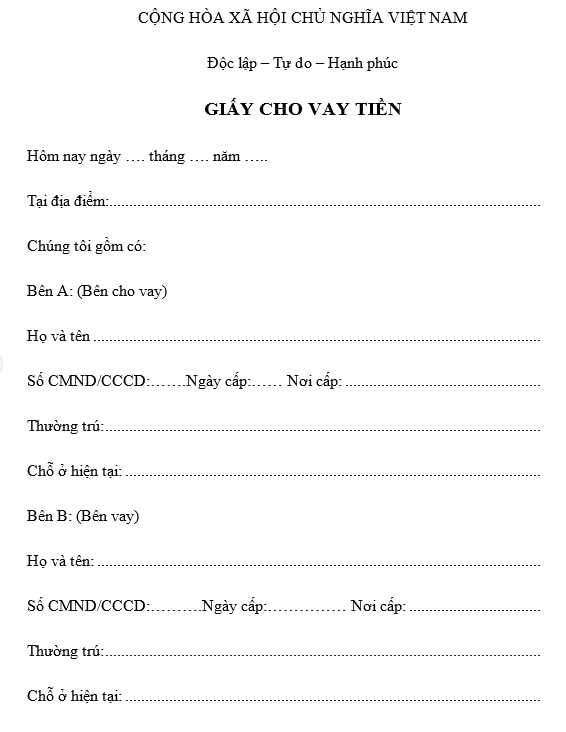To download the personal loan note template? What are the regulations on obligations of borrowers to repay loans in Vietnam?
Vietnam: To download the personal loan note template?
Currently, legal documents do not specifically stipulate the personal loan note, so readers can refer to and download the personal loan note template below:

Download personal loan note template here: download

To download the personal loan note template? What are the regulations on obligations of borrowers to repay loans in Vietnam?
What is the basic content of a personal loan note in Vietnam?
A loan note can be considered a form of asset loan contract and the parties to the contract have the right to agree on the content of the contract.
According to Article 463 of the 2015 Civil Code, Contract for the loan of property means an agreement between parties whereby a lender delivers property to a borrower. When the loan falls due, the borrower must repay the lender property of the same type in accordance with the correct quantity and quality, and must pay interest if so agreed or so provided by law.
Accordingly, the contracting parties may agree on the contents of a contract. The contract may have the following contents according to Article 398 of the 2015 Civil Code, specifically as follows:
- Subject matter of the contract;
- Quantity and quality;
- Price and method of payment;
- Time limit, place and method of performing the contract;
- Rights and obligations of the parties;
- Liability for breach of contract;
- Methods of settlement of disputes.
What are the regulations on obligations of borrowers to repay loans in Vietnam?
The obligations of borrowers to repay loans is stipulated in Article 466 of the 2015 Civil Code as follows:
- Where the property lent is a sum of money, the borrower must repay the lender the loan in full when due. If the property is an object, the borrower must deliver to the lender an object of the same type, quantity and quality, unless otherwise agreed.
- Where a borrower is not able to deliver an object, it may, with the consent of the lender, repay the value of the borrowed object, in cash, as at the time and place of delivery.
- The place for repayment of a loan shall be the place of residence or head office of the lender, unless otherwise agreed.
- If a borrower fails to repay all or any instalment of an interest-free loan, in whole or in part, when payment falls due, the borrower must, if the parties so agree, pay interest on the overdue amount from the due date until the date on which payment is made, at the basic interest rate prescribed in Clause 2 Article 468 of this Code, unless otherwise agreed or otherwise prescribed by law.
- If a borrower fails to repay, in whole or in part, a loan with interest, the borrower must pay:
+ Interest on the principal as agreed in proportion to the overdue loan term and interest at the rate prescribed in Clause 2 Article 468 in case of late payment;
+ Overdue interest on the principal equals one hundred and fifty (150) per cent of the interest rate in proportion to the late payment period, unless otherwise agreed.
What are the regulations on rate of interest for a personal loan in Vietnam?
The rate of interest for a loan is specified in Article 468 of the 2015 Civil Code as follows:
Interest rates
1. The rate of interest for a loan shall be as agreed by the parties.
The rate of interest for a loan agreed by the parties may not exceed 20% per year, unless otherwise prescribed by law. According to actual conditions and at the proposal of the Government, the Standing Committee of National Assembly shall adjust the above interest and send report to the National Assembly at the latest session.
If the agreed interest exceeds the maximum interest prescribed in this Clause, the agreed interest shall become invalid.
2. Where parties agree that interest will be payable but fail to specify the interest rate, or where there is a dispute as to the interest rate, the interest rate for the duration of the loan shall equal 50% of the maximum interest prescribed in Clause 1 of this Article at the repayment time.
Accordingly, the loan interest rate is agreed upon by the parties when drawing up the loan document. The agreed interest rate must not exceed 20%/year of the loan amount, unless other relevant laws stipulate otherwise.
- In case the agreed interest rate exceeds 20%/year of the loan amount, the excess interest rate will not be effective.
- In case the parties have an agreement on interest payment, but the interest rate is not clearly defined and there is a dispute about the interest rate, the interest rate is determined at 50% of the interest rate limit (the agreed interest rate cannot exceed exceed 20%/year of the loan amount) at the time of repayment.
LawNet